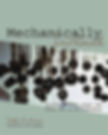Grammar and Vocabulary in Middle School Reading/Writing Workshop
- Megan Mariano
- Sep 18, 2019
- 4 min read
Updated: Nov 20, 2019

Many teachers who embark into the world of Reading and Writing Workshop beg to question: how do you get in vocabulary and grammar instruction? There are lots of different ways to approach this, but with limited time, we want to make sure it's meaningful.
This is how it's done in my 6th grade classroom: students learn vocabulary through their reading and grammar through mentor texts. That's it. That's my grammar and vocabulary program. Read on to find out more!
Vocabulary Notebooks
There are loads of programs out there for vocabulary instruction. I do not give my students a list of words to learn and memorize. I have not found this to be valuable for them. Many just memorize them for a test or assessment then forget about them. Unless you actively get the students using those list words on a regular basis, it's a waste. I simply do not have the time nor energy to approach this strategy. It's very challenging to get them to use words over and over without it seeming forced.
I wanted vocabulary to be a more organic experience. So, in the spirit of the workshop model, I decided to have my students get their vocabulary from their own reading. Isn't this how we, as adults, learn new words? We learn new words from our reading.
I created a digital vocabulary notebook for my students. In this notebook, students would gather 4 words a week from their independent reading. These would be words of which they do not know the meaning. Each page represented a different word. Using the Frayer model, students would fill out each page, pulling the line from the text that they got the word. Then, they'd add a word to a class shared dictionary (a dictionary that the entire class shares).
Throughout the weeks, they'd have to add these words to their writing somewhere. They'd simply highlight it so I'd know it's a word from their books. The words could be added to writing pieces or reading responses.

This year, I am doing something similar, but changed it up a bit. Students are still gathering words from their texts, but instead of them adding a word per page, I adapted it to be more like digital word walls. This allows them to search for specific types of words more easily and throws a bit of grammar in there, too. The "walls" are separated by parts of speech. Similar to the notebook, they have to use the words in their writing pieces or reading responses.
I do not give any tests on vocabulary. I do not do lessons on vocabulary. It takes time from reading and reading is how one learns new words!
Mentor Sentences & Jeff Anderson
I am not sure who came up with the idea of mentor sentences (a.k.a. sentence of the week). I just know I've seen the idea behind them floating all around the Interweb. The idea behind mentor sentences is that students learn grammar from a provided sentence. There are tons of approaches to this on Teachers Pay Teachers and here's how I went about doing it with my classes.

Again, I did this digitally. I created a digital notebook to be used at the end of every class period for 10 minutes max. I pull a sentence from a shared text we read together. The sentence I pull displays a specific grammar skill. Each day is a different focus:
Monday: Focuses on what they notice about the mentor.
Tuesday: Label parts of speech and focus on a specific skill.
Wednesday: Create their own sentences like the mentor.
Thursday: Find sentences like the mentor in their own texts.
Friday: Spiral review.
This causes them to notice grammar in actual reading. You can find my mentor sentences here.
The only hiccup with this is that students do need to have some concept of parts of speech for the labeling component. No matter how you slice it, there is going to have to be some direct instruction when it comes to parts of speech (blech). I don't do a ton and some people disagree with me, but I don't think it's super important to know all the parts of speech. I mean, if you know how to use them, that's what matters, right? And how do you learn to write properly? Through reading and writing.
What's tricky for me is, if I had it my way, I wouldn't explicitly teach grammar at all. I would do more writing, writing, writing, but unfortunately I would do a disservice to my students as they go forward in schooling. When they get to high school, they will encounter lots teachers who drill, drill, drill grammar so I do try to incorporate *some* direct instruction. This year I am giving interactive notebooks a whirl. This is mostly because my students are digital so often that I wanted to get some hands-on work in, too. I'll let you know how that goes later in the year!

Another great resource for grammar in the writing workshop is Jeff Anderson. He uses the idea of mentor sentences and weaving grammar into the workshop. Take a look at his book Mechanically Inclined.
Bottom Line
I know many of you are tied to a curriculum, but consider what you are using. Are students absorbing the new words and grammar skills? How can they authentically do this without taking time from valuable reading and writing?









